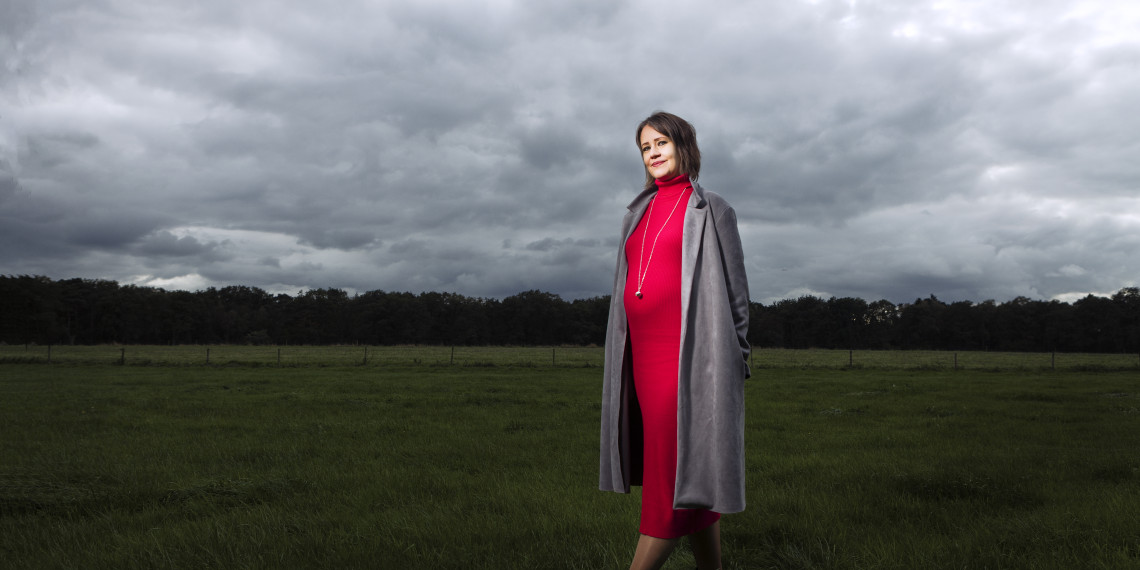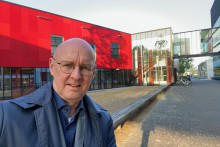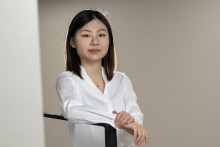It’s 18 March 2020. Heidi can still see herself standing at the airport in Helsinki. Her flat has just been emptied. Her belongings have already been transported to the Netherlands. The Finnish government is about to close the borders due to Covid-19. Flights are being cancelled, but she HAS to get to Amsterdam. There, the love of her life awaits, with whom she will embark on a new adventure. By a stroke of luck, she manages to get the very last flight.
Now, more than three years later, she can laugh about it. ‘My boyfriend had arranged for us to stay in a nice hotel in Amsterdam. ‘We were looking forward to a full and hearty breakfast, but we had to make do with two small breakfast bags that they pushed at us from a distance.’
Back then, she could hardly have imagined that three years later, she would be pregnant with her first child, living in Tilburg, working at UT and the proud winner of the “Teacher of the Year” award.
What a difference a few years can make.
About dolphins and bullying
Toivonen grows up as an only child with her parents in Helsinki. Her mother looks after her full-time, which is not very common in Finland. Initially, this was a conscious choice by her mother, but later - due to the economic recession and scarcity of work - it became a forced choice. ‘It didn’t make my childhood any easier. I think that’s why I liked going to school.’
At the age of four, she teaches herself to read, because she loves books. Young Heidi is a shy, introverted girl. She has a regular group of friends at school, but she is also bullied. ‘I was always reading and writing, those were my favourite pastimes. But I didn’t say much.’ Except when she got to appear on stage. ‘Somehow, I would overcome my shyness at those moments. I remember one time - I must have been nine or ten years old - when I asked if I could play teacher in front of the class. I talked about dolphins. I loved standing in front of the class.’
'Encouraging each other to get high grades was simply the culture'
Her teenage years aren’t easy either; the bullying continues. Eventually, she opts for a high school with strict admission requirements. ‘The average grade needed for admission was high. That meant that all the students who attended that school were ambitious and eager to study. When I was admitted there, I was no longer an outsider; I was among like-minded people. And so, I ended up enjoying my high school days, even though it was a very intensive period. We pushed each other to get high marks, that was the culture. So we had to work hard.’
Finnish language and literature
She had been interested in psychology from a young age and pursuing a degree in that field would have been the obvious choice. ‘But after my strenuous time in secondary school, I was exhausted and didn’t have the energy to take the entrance exam. I would have had to study for months before taking the exam and hope that I would be among the 10 percent who would be admitted. That’s why I decided to study Scandinavian languages at the University of Helsinki instead, with the prospect of becoming a translator in the back of my mind.’
(Text continues below the photo.)

She realises that with that course of study, she cannot help people the way she would like to. Therefore, Heidi chooses a new path and moves to eastern Finland to study psychology at the university. ‘Finally, I felt like I was at the right place. Even though I also found it hard to live in eastern Finland. I felt like people had prejudices against anyone coming from Helsinki and speaking with the capital region dialect. I didn’t really fit in. The city where I studied had about 76,000 inhabitants and was really too small for me. But I did meet a person who would become one of my best friends there. I would never have met her otherwise.’
Mother and child
After her graduation, the young psychologist gains work experience in various clinics. For example, in 2011 she works at a Mother & Child clinic in Helsinki which treats pregnant women, mothers and young children for a wide range of problems. The day she moves to Helsinki for this job, her mother suffers a stroke. ‘Immediately after I arrived, I took a taxi to go to the hospital. There she passed away two weeks later.’
‘I lost my mother and at the same time, I was helping future mothers at my job as a psychologist. I was very conflicting. Her illness and death forced me to deal with some difficult issues. I had a strained relationship with my mother. She was very controlling and overbearing. That caused tension. It was only after her death that I really understood the impact our relationship had had on me. And in the end, I found myself again.’
The relationship between parent and child can have a huge impact on your life, she says. ‘Nothing is black or white, there are so many grey areas. The younger you are, the more you idolise your mother. Then suddenly you see her as a monster. The reality is somewhere in between. At any rate, my mother had a complex character because of her own background. I know she didn’t have an easy time growing up either.’
‘Students should absolutely feel safe’
In 2012, Heidi starts her doctoral research alongside her work as a clinical psychologist in a hospital. ‘I worked on my PhD in the evenings and weekends. I wanted to do more research on complicated cases for which there is no solution because our healthcare system is bogged down. I was also dealing with that personally and it frustrated me. Doing research gave me inspiration again. Some people worried that the combination of work and research might lead to burnout. But I always said: ‘Doing a PhD actually keeps me from getting burned out. It was intellectual work and opened up a new world for me.’
Then, once again, everything changes.
Breast cancer
At age 34, she discovers a lump in her breast. Soon she learns it is cancerous. ‘I reported sick. What followed was surgery, chemotherapy and radiotherapy. I lost all my hair because of the chemo.’ Meanwhile, she continues writing her dissertation. ‘It gave me hope, at least I had a goal: I would defend my dissertation no matter what.’
Exactly one year after discovering the lump in her breast, she obtains her PhD.
‘And more wonderful things happened,’ she continues excitedly. ‘I also met my current partner in that difficult year. We’re still together and he is also the reason I moved to the Netherlands. After I had earned my PhD degree ,he said: why don’t you come with me?’
‘Looking back now, I realise how bizarre that year was. From sick to healthy. From sadness to joy. And I found love.’
Positive feedback
She and her partner, who hails from Italy, end up in a flat in Tilburg. And since 2021, she has had an appointment at UT as assistant professor in narrative research. This area of research focuses on narrative aspects of human experiences. Because it is at least a three-hour commute to UT, she and a colleague rent a small flat in Hengelo together.
How is it that after barely two years of teaching, she has already won the title Teacher of the Year?
‘When I began teaching, I soon started getting positive feedback from my students. For me, that was confirmation that I was on the right track; teaching felt like coming home,’ she says. ‘I want to connect with students and listen to their needs. Having been a psychologist for ten years helps in a way, because you know how to listen well and really connect. You know how to set boundaries and how not to overstep. I try to find interesting ways to convey to students what I know. I genuinely care about whether they understand. Is this relevant? Is this inspiring enough?’
'Writing about your own life is not easy'
On top of that, she tries to ‘be in the moment,’ she says. And take her time. She always pays attention to whether students are engaged during class. ‘Are they looking at me or at their phones? I try not to put myself on a pedestal as lecturer. I think teachers should have authority, but that doesn’t mean they should be authoritarian. I take the time to be there, look at them and observe them. What are they doing and how do I engage them?
Creating a sense of safety in the lecture hall is a ‘big thing’ that she values greatly, she says. ‘Students should absolutely feel safe.’
She also teaches diagnostics and how to write up a report on a patient. These tutorials are very ‘hands-on,’ she explains. She also interacts with her students during small-group thesis supervision sessions. Her favourite is the Personal Reflection module. This is a course that master’s students in the Positive Clinical Psychology and Technology program take before they start their internship. ‘They learn about mindfulness and meditation and write down their own life story. That can be quite emotional for some, because writing about your own life is not that easy. So it gets pretty deep, but I love those classes.’
‘We should never feel ashamed of things that are not our fault and can ultimately make us stronger as individuals. Life comes in all colours and shapes. But we need other people’s stories to help us realise that no one’s life is perfect. That is why I am sharing my story too, now in this interview. As a teacher, it’s not about me.’
How about the future? She wants to continue in academia, that’s for sure. ‘I want to continue to teach, to do research and I am writing a book. The book is about agency in times of climate crisis. Publishing this book would be a nice thing. And then, of course, getting more research done, taking more steps to learn new kind of methods and apply them to new topics. Just advancing my research, and becoming a better teacher. And where that will be? I have learned to never say, oh, this is where I stay. So far, I have enjoyed the UT a lot. But life is long and anything can happen.’








